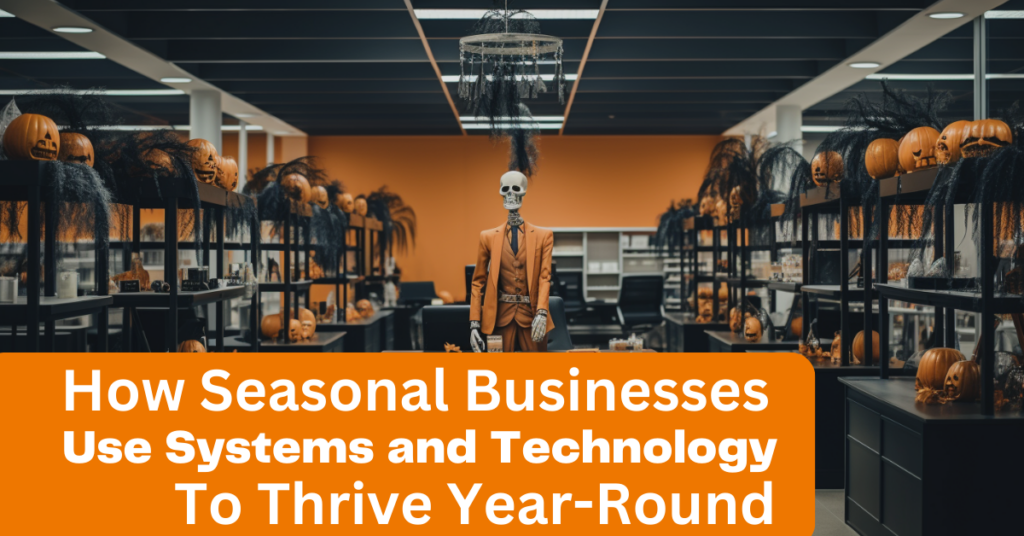Halloween marks the race to the end of the year – everything after this month seems to fly by. Of course, if you have kids, this month flies by anyway. In the US, Halloween is a pretty big deal. It’s the autumnal holiday, and with it we can look forward to piles of candy and fun costumes.
But where do you go shopping for your Halloween costumes and decor? Online? Walmart? Target? Or is it that iconic red, yellow, and black sign that appeared suddenly in what used to be a Bed Bath and Beyond at your local strip mall?
Seasonal businesses are fascinating, Spirit Halloween especially so. But what are they doing right? And what systems do different types of seasonal companies incorporate to keep returning year after year? Discover how seasonal businesses thrive all year—insights any business owner can use.
How Spirit Halloween Operates

There are about a million different places to get Halloween decorations now, but time and time again, we see people getting excited about Spirit Halloween especially. With an estimated annual revenue of around $1.5 Billion per year and 1,500 new stores opening as of 2023, there can be no doubt that Spirit Halloween is doing something right.
The logistics of running any business can be complicated, and with Seasonal Businesses, even more so. Spirit Halloween’s team has to do everything a regular store does, and then they have to ensure they find the right real estate and have powerful enough inventory to excel next season. The good news is that they have months to do exactly that.
Real Estate
Finding the right real estate for a pop-up store, especially a seasonal one, is key to attracting maximum foot traffic. This is so integral to Spirit Halloween’s operations that they’ve devised systems to streamline this process. Introducing Artificial Intelligence (AI) and automation could further refine this process. AI’s capability to analyze vast market data offers insights into market trends, aiding in optimal location identification12. Predictive analytics could foresee market demands, aiding in strategic store location planning.
According to a Vox article, Spirit Halloween has a dedicated real estate team working year-round to scout and secure locations for the next season. This ensures prime spots at favorable lease terms. AI could augment this effort by expediting document review processes, minimizing the time to secure desirable locations. The blend of human expertise and AI could potentially reduce operational costs in real estate management, making the process more efficient.
Securing the perfect real estate ensures they get prime spots at favorable lease terms, setting the stage for another successful season.
Inventory Management

The thing about a seasonal industry specializing in costumes and decorations is that to ensure people want to come; you must be very careful about determining your inventory. This is true for any brick-and-mortar business, Spirit Halloween has a leg-up over their competitors in that specializing in this particular industry allows them more time and resources to ensure that their Halloween products are more in-line with their customer’s specific wants.
Now, I’m entering the realm of pure imagination – but this process could be assisted with the correct systems. For example, an advanced inventory management system that uses previous sales data and current trends to help you determine what products will perform best the following year alongside a team of specialists can ensure that when your doors open, your merchandise is better than that of your competitors.
Of course, it’s not just Spirit Halloween that has only one time of year to engage their ideal client.
What’s this? What’s this?! There’s tree farms everywhere…

After Halloween has passed, and we stuff ourselves with Turkey, it’ll be time to put up our Christmas Tree. And many families prefer to go out to the store to select their ideal tree before loading it up and bringing it home. But what happens to Tree Farms after New Year, when presents have been unwrapped, and trees are disposed of?
Diversifying Your Strategy and Income

While Spirit Halloween prepares for a busy season ahead in advance, many tree farms don’t have the luxury of shutting down completely. Unlike Spirit Halloween, which focuses on inventory and real estate, tree farms often diversify their income streams.
They may offer seasonal activities like pumpkin patches in the fall or flower picking in the spring. Some even convert their spaces into event venues for weddings or corporate events. This diversification is crucial for their year-round survival. And it answers the question of how to manage a budget after a particularly difficult season. We touched on this in a previous blog where we addressed implementing solutions under imperfect circumstances.
But these are very 20th-century solutions.
We tend to think farms are relatively low-tech, but that’s just not true in the 21st century. Industry-specific management software exists for just about every type of business you can imagine. Incorporating AI and automation can significantly revolutionize the operational landscape of tree farms. For example, drone technology is already being employed to optimize pesticide use in agriculture, precisely locating areas most infected with pests, which in turn reduces costs and increases yields.
Real-time data and long-term data tracking are equally valuable, regardless of industry.
Everyone Pays Taxes…But Tax Season Only Happens Once A Year

After Christmas, tax season looms over our heads like a terrifying specter. Very few look forward to Tax season. Unless, of course, you’re a tax preparation specialist!
There are examples of small finance and accounting firms that have tax training, but I’m focused on those companies that operate exclusively in Tax preparation. What happens come April when Taxes are filed? How do companies like H&R Block and Turbo Tax and their smaller counterparts ensure they’re prepared for the following tax season?
Financial Forecasting: No Crystal Balls Here
Across all the business types I’ve discussed, financial forecasting emerges as a critical factor for seasonal success. And, of course, numerous systems and software exist to help precisely with this.
Financial planning software can help these companies set budgets, forecast revenue, and allocate resources effectively. According to a report by Gartner, 82% of companies that excel in financial planning use specialized software for budgeting and forecasting. This allows them to make data-driven decisions that contribute to their long-term success.
Successful seasonal companies have these systems down to a science.
Hiring for a New Season

For tax preparation companies like H&R Block and TurboTax, the hiring season is a sprint, not a marathon. They have a limited window to find, vet, hire, and onboard new employees to prepare for the tax season. This makes human resources systems crucial in ensuring a smooth and efficient process.
Given the time-sensitive nature of their operations, these companies often rely on Applicant Tracking Systems (ATS) to streamline the recruitment process. These systems allow them to sift through resumes, schedule interviews quickly, and even conduct initial screening tests, saving valuable time and resources. And now, with AI, they could feasibly look at the resumes and data on those best-performing workers in the past and then begin shuffling out candidates who don’t meet the same criteria.
Once suitable candidates are selected, the next challenge is to get them up to speed as quickly as possible. Onboarding systems can help by providing new hires with training materials, company policies, and other essential information even before their first day on the job.
Organizations with a standard onboarding process experience 54% greater new hire productivity. This is particularly important for seasonal businesses that don’t have the luxury of a prolonged training period.
By having these systems in place, tax preparation companies can ensure they are not just prepared for the tax season but can also provide consistent, high-quality service to their clients year after year.
A Technology Solution for Everything
When I was staring at ghoul masks at my local Spirit Halloween, I wasn’t expecting to find myself walking down a path that would lead me to reflect on the seasonal business model and the current integration of AI. Whether you’re a year-round business or a seasonal operation, a nonprofit or for-profit, our agricultural industry is being shaped and improved by software designed to help them track, systemize, and automate all kinds of processes. The right technology can be the linchpin for business success, regardless of season.
Tiffany Rosik, founder and CEO of TGR Management Consulting, advises Fortune 1000 companies on aligning business and technology initiatives to achieve growth. Tiffany goes beyond project best practices by coaching Project Team Leaders on team dynamics and techniques to establish a self-sustaining model that creates a consistent experience and produces results. Connect or follow Tiffany Rosik on LinkedIn.




